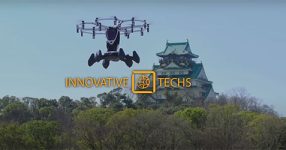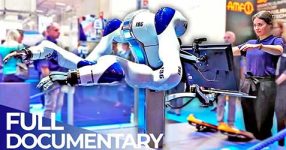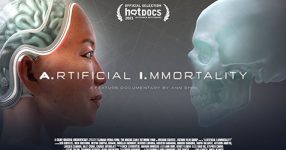The documentary “The Economy of Tomorrow” explores the challenges faced by the world, focusing on building stronger economies with equal opportunities, sustainability, urbanization, addressing the gender gap, and dealing with the demographic time bomb.
The Fourth Industrial Revolution
In this segment, the documentary introduces the concept of the fourth industrial revolution, emphasizing the transformative impact of technologies such as artificial intelligence, 3D printing, robotics, big data, and advancements in life sciences. The revolution is portrayed as a departure from previous industrial revolutions, not just reshaping industries but also redefining jobs previously considered exclusive to humans.
Artificial intelligence takes center stage as the driving force behind the fourth industrial revolution, with machines gaining the ability to match or surpass human cognitive abilities. The potential benefits, such as driverless cars and advancements in drug development through big data, are highlighted, offering liberating impacts on various aspects of human life.
Job Displacement and Economic Transformation
The documentary delves into the concerns raised by experts like Martin Ford, a software entrepreneur, who predicts a future where millions of skilled workers could lose their jobs due to automation. The evolution of technology, specifically machine learning, is identified as a key factor leading to job displacement, with smart software algorithms becoming capable of learning and making predictions without explicit human instructions.
The economic landscape is poised for transformation, as studies suggest up to half of the jobs could be susceptible to automation in the next two decades. The potential loss of 60 million jobs in the United States alone prompts a need for adaptation and a reevaluation of how society approaches employment.
Adapting to Change: Healthcare and AI Collaboration
As the fourth industrial revolution unfolds, the documentary showcases how the healthcare sector is adapting to disruptions caused by artificial intelligence. IBM’s research project involving Watson demonstrates the collaboration between intelligent machines and medical professionals, particularly in diagnosing and treating life-threatening diseases like skin cancer.
Business leaders are depicted grappling with the challenges and opportunities presented by this new era, emphasizing the need for informed decision-making to navigate the complexities of the evolving economic landscape.
Urbanization Challenges: Megacities in Focus
The documentary shifts its focus to the challenges posed by rapid urbanization, using examples like Lagos, Nigeria. It explores how cities are grappling with issues of governance, control, and infrastructure overload, showcasing contrasting approaches such as grassroots community development and large-scale planned projects like Echo Atlantic.
The potential destruction of a city’s immense potential due to uncontrolled growth is emphasized, but the documentary remains optimistic, highlighting success stories and the potential for cities to thrive with proper planning and diverse, visionary leadership.
Gender Gap and Societal Impacts
The gender gap becomes a central theme, addressing not only its societal implications but also its economic imperative. The documentary argues that achieving gender equality is crucial for business success, emphasizing the market opportunity and potential losses to the bottom line when companies underperform in this regard.
Personal stories, such as Anne-Marie Slaughter’s decision to leave her dream job for family reasons, underscore the challenges women face in balancing career aspirations with caregiving responsibilities. The documentary explores global efforts to close the gender gap, discussing initiatives in Scandinavia that redefine work and parenthood to narrow the divide.
Challenges, Opportunities, and Optimism
The Economy of Tomorrow” concludes by acknowledging the immediate challenges posed by the fourth industrial revolution, such as job displacement and urbanization issues. However, it maintains a sense of optimism, suggesting that adaptation to these changes can lead to long-term positive outcomes, both economically and societally. The need for proactive decision-making and a shift in cultural norms is emphasized as society navigates the uncharted territory of the AI revolution and its impact on the global economy.












